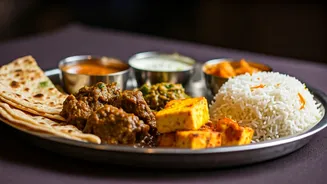A Culinary Legacy
Awadhi cuisine, originating from the city of Lucknow, also known as the 'City of Nawabs,' is a culinary tradition deeply rooted in history. It reflects
the opulent lifestyle and refined tastes of the Mughal era, with a focus on slow cooking techniques and a variety of aromatic spices. The cuisine is celebrated for its rich flavors and delicate textures, crafted by skilled chefs. The slow-cooking process is key, as it allows the ingredients to meld together, creating complex and satisfying tastes. The extensive use of spices, meticulously blended to balance flavors, is another trademark, resulting in unique and unforgettable dining experiences. Awadhi cuisine has evolved over centuries, embracing influences and adapting to local preferences, yet has always maintained its core values: quality, flavor, and elegance.
Key Cooking Techniques
The uniqueness of Awadhi cuisine is also due to its distinct cooking techniques. One of the most important is 'dum,' or slow cooking in sealed containers, which allows food to simmer in its own juices and absorb the flavors of the spices and other ingredients. The 'bhuna' technique is also significant, involving frying spices and ingredients over low heat to bring out the taste and aroma. The use of 'ghee' (clarified butter) is widespread, providing a rich base for many dishes. Marination is also a crucial step, with meats often marinated in blends of yogurt and spices, tenderizing the meat and infusing it with flavor before cooking. The chefs use their skills to delicately balance flavors and textures. These techniques, combined with a meticulous approach to ingredient selection and preparation, distinguish Awadhi cuisine and contribute to its worldwide acclaim.
Signature Awadhi Dishes
Awadhi cuisine is famous for a variety of flavorful dishes, each demonstrating its distinct culinary style. 'Biryani,' a rice and meat dish cooked using the 'dum' method, is a staple, with the rice absorbing the rich flavors from the meat and spices. 'Kebabs,' available in many forms, such as 'Galouti Kebabs,' are soft, melt-in-your-mouth delicacies. 'Nihari,' a slow-cooked meat stew, is another popular dish known for its intense flavors and tender meat. Various curries, such as 'Korma' and 'Pasanda,' are also an essential part of the Awadhi food culture, often prepared using slow-cooking methods with a balance of aromatic spices. These dishes, among many others, highlight the diversity of the cuisine and the culinary expertise of the region. The careful preparation and use of local spices add to their uniqueness, providing a truly amazing experience.
Spices and Aromatics
The extensive use of spices and aromatics is critical to the distinctive flavor of Awadhi food. Saffron, cardamom, cloves, and cinnamon are some of the most commonly used spices, carefully added to achieve complex flavor profiles. Fresh herbs like coriander and mint are often used to enhance the freshness and add a visual appeal. 'Itar,' or flower extracts, is sometimes added to enhance the aroma, contributing a delicate, floral note to various dishes. The skillful blending of spices is an art form in Awadhi cuisine, with chefs carefully selecting and combining ingredients to create unique flavors. This expertise gives Awadhi cuisine its distinctive and unforgettable taste. The combination of high-quality spices, fresh herbs, and aromatics gives the food its depth and complexity, establishing its appeal worldwide.
Cultural Significance
Awadhi cuisine represents more than just food; it is an important aspect of Lucknow's cultural identity. It is closely connected to the city's history, traditions, and the influence of the Nawabi era. The emphasis on hospitality and sharing meals reinforces the cultural values of the region. Dining is often a communal experience, with meals designed to be shared and enjoyed with family and friends. The cuisine reflects the city's heritage of refinement and elegance, as demonstrated in the methods of preparation and presentation. Awadhi food has become a symbol of Lucknow's cultural values and hospitality, attracting many visitors from different places and helping them experience the city's rich history and diverse culture. This connection to the local culture makes Awadhi food a memorable experience.
UNESCO Gastronomy Hub
The recent recognition of Lucknow as a UNESCO Gastronomy hub is a historic moment for Awadhi cuisine and the city. It recognizes the excellence of the culinary tradition, the expertise of the chefs, and the preservation of traditional cooking methods. This prestigious designation will also support local culinary tourism and encourage the growth of the food industry in the region. The title will promote Lucknow as a culinary destination, which will attract food enthusiasts from around the world. Being recognized by UNESCO is a confirmation of the culinary heritage and a boost for Lucknow's tourism, offering people from different backgrounds an opportunity to explore the city's history, cultural values, and, most importantly, the delicious Awadhi cuisine.














